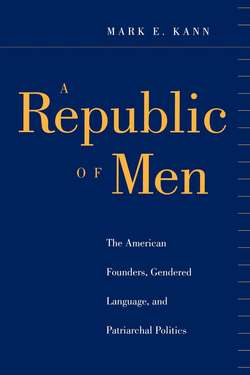Читать книгу A Republic of Men - Mark E. Kann - Страница 22
На сайте Литреса книга снята с продажи.
Order in the Ranks of Men
ОглавлениеThe Boston colonists who resisted royal authority set a lasting precedent when they “chose to hazard the consequences of returning back to the state of nature rather than quietly submit to unjust and arbitrary measures.”49 Henceforth, most founders feared, American men exhibited a propensity to claim unlimited rights and hazard disorderly conduct whenever they opposed public measures, even those enacted and administered by their own representatives. The founders developed and deployed the grammar of manhood to encourage American males to engage in self-sacrifice in defense of liberty and to exhibit self-restraint in the exercise of liberty, to support and consent to deserving leadership, and thereby to promote order in the ranks of men.
The founders’ grammar of manhood consisted of hegemonic norms and rules meant to move the hearts of men. Its main message was that a male worthy of self-esteem, social respect, and civic dignity achieved manly independence, family status, and governance of women by fulfilling intergenerational obligations, fixing a settled place for himself and his heirs, fitting into fraternal society, recognizing and deferring to worthy leaders, and helping to father a new nation. This message was steeped in blood. Manhood was a matter of blood bonds between fathers and sons, the investment of blood in land and liberty, the kindred blood that defined fraternal society, the innocent blood that linked ancestral sacrifice to future happiness, the risking and shedding of blood that tested citizens and leaders, the bloody birth of the body politic, and the factional bloodletting that imperiled the Republic’s survival.50
The grammar of manhood offered little direct guidance regarding male-female relations. However, the founders assumed that women motivated men to risk their blood and defend liberty, bore their children, contributed to family provision and comfort, and supported men’s fraternal relations and nation-building ambitions. Ongoing patriarchal domination ensured women’s assistance in American men’s procreative mission to shape the course of history. The founders saw themselves as autonomous historical agents, the fathers of a new people, land, society, and republic destined to change the world for the better. They inflated the value of their natality, in part, by devaluing female sexuality. They instituted a new republic in which the prior identification of women with bloody childbirth and men’struation would gradually give way to the Victorian era’s bloodless images of female passionlessness and political innocence.51
The founders communicated challenging standards—and they were convinced that many males did not measure up to everyday expectations about manly courage and self-restraint. Cowards and libertines betrayed ancestors and offspring, transformed liberty to license, engaged in deceitful and criminal conduct, and fueled the factionalism that mobilized mobs and leveled republics. Worse, the example of a few licentious men threatened to awaken within America’s more sober family men dormant passions, impulses, and interests that threatened to destroy social harmony and political legitimacy. The founders generally believed that only the most mindless democrat would advocate the rights of man and citizen for disorderly males who acted like children. They did not deserve the rights of men. Nor could they be trusted to participate in politics. Like women, they needed to be governed to ensure public order.
